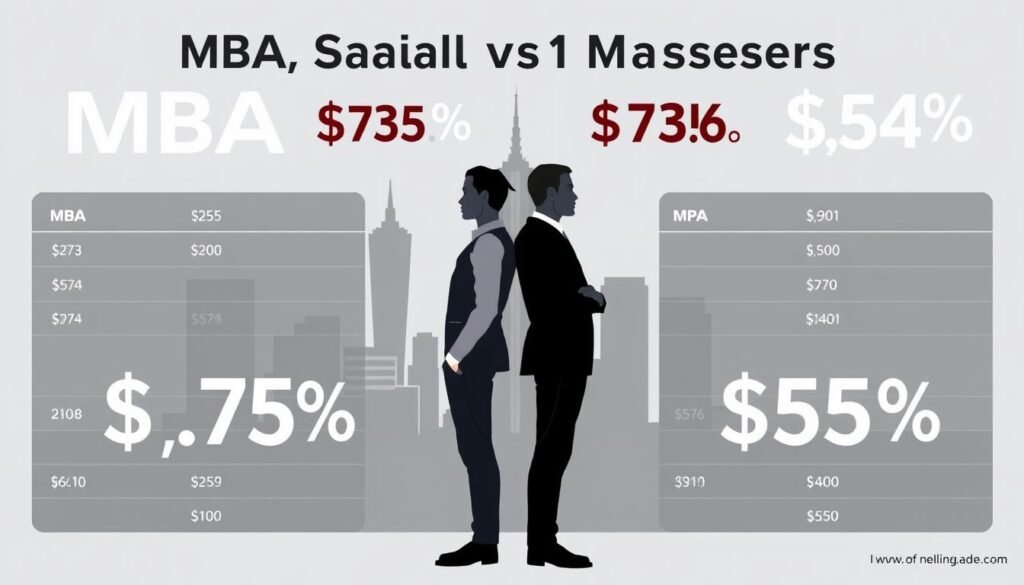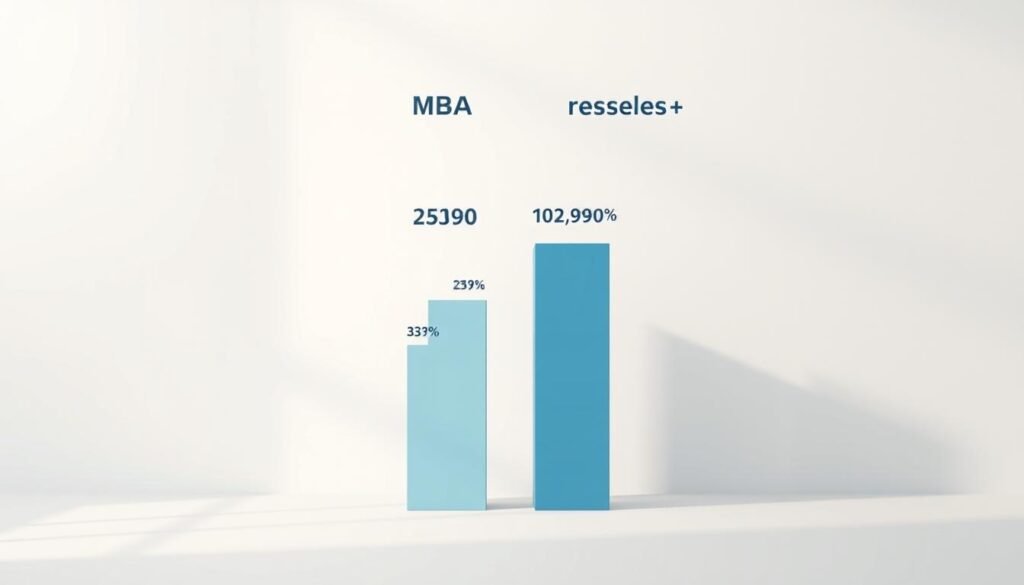
MBA vs Masters Salary Comparison Guide USA

Imagine this: you finish a program and open an offer letter that could change your life. You feel thrilled, then you wonder what led to that number program choice, industry, or timing.
You want clear facts, not hype. This guide gives quick, practical context on pay bands, job pace, and cost-to-payback for business and tech tracks.
Expect starting pay for many mba grads around $115,000–$128,000 and many master paths near $95,000–$115,000. Placement data shows about 95% of graduates find work within three months, while 91% of recruiters hired mba talent in 2023.
Explore high-demand careers, salary insights, required skills, and full step-by-step pathways to grow your professional future.
Explore Careers Guide →Programs usually run 1–2 years. Costs differ: typical mba tuition often falls between $60K–$100K, and many master programs range $30K–$60K. We’ll frame your choice by outcomes: earnings, speed to hire, and industry fit.
Next, you’ll map degrees to fields consulting and finance favor mba hires, tech and data favor ms graduates and weigh recruiter demand and OPT benefits for international students.
- What you’re really comparing today: leadership breadth vs technical depth for U.S. salaries
- salary comparison MBA vs masters USA: pay, placement, and industry differences
- Costs, duration, and ROI: what you invest for the paycheck you expect
- Career paths and eligibility: which degree aligns with your role goals
- Curriculum focus that drives salaries: management breadth vs specialized mastery
- Your next move for higher pay: map salary targets to degree, industry, and experience
What you’re really comparing today: leadership breadth vs technical depth for U.S. salaries
You’re weighing a path that trains you to lead people and projects against one that makes you the go-to technical expert.
An MBA prepares you for cross-functional management decision-making, team leadership, and strategy across finance, marketing, operations, and HR. Classrooms lean on cases and peer experience; many applicants bring 3+ years of work experience to discussions.
A master’s centers on deep technical knowledge data science, engineering, or information systems. These programs focus on hands-on projects and research that fast-track technical roles for earlier-career students.

- Pick management roles and consulting if you prefer breadth and stakeholder influence.
- Pick software, analytics, or engineering if you prefer building systems and models.
- Your experience level should guide your study and role expectations.
| Focus | Typical profile | Common roles |
|---|---|---|
| Leadership breadth | 3+ years work experience | General manager, consultant, product strategy |
| Technical depth | 0–3 years, early career | Data engineer, software developer, analytics |
| Key payoff | Management impact | Specialized technical impact |
For a quick guide on typical returns and career outcomes, see this average MBA returns to help align your degree choice with your goals.
salary comparison MBA vs masters USA: pay, placement, and industry differences
Deciding which route gives you the best return means matching your work history and target roles to market demand. Use pay bands and placement data to set realistic expectations before you commit.
Average and median pay at a glance
Typical ranges: many mba graduates see offers clustering around $115,000–$128,000, while most master’s graduates typically land between $95,000 and $115,000 depending on discipline.

Industry impact
Consulting and finance routinely lift packages for business-track grads through base pay and performance bonuses.
In contrast, technical fields like software and data often push master’s hires to six figures quickly, with fast growth as you gain seniority.
Your years in the workforce shift your starting offer. MBA cohorts usually bring 3+ years and slide into leadership tracks faster.
Early-career graduates often enter technical roles and grow compensation by delivering specialized impact.
Placement and demand
Market signals: roughly 95% of mba graduates found jobs within three months, and 91% of recruiters hired mba talent last year which shows strong employer appetite.
Role-level comparisons
| Role family | Typical entry range | Why it pays |
|---|---|---|
| Strategy / Finance / Marketing | $110K–$140K | Leadership scope + bonus potential |
| Software / Data / Engineering | $95K–$130K | Technical skill demand and rapid progression |
| Product / Operations | $100K–$130K | Mix of technical and business impact |
Bottom line: map your target roles and locations to these bands. Your path will determine whether leadership breadth or technical depth drives higher pay for you.
Costs, duration, and ROI: what you invest for the paycheck you expect
Investing in a graduate program means weighing upfront cost against the pay bump you expect afterward.
Tuition ranges now: many mba programs charge between $60,000 and $100,000. Many master programs fall in the $30,000–$60,000 band. National averages sit near $63,720 for business-track mba programs and about $56,040 for master's business tracks.
Program length: most students finish in one to two years. Accelerated options shorten that timeline; part-time or online formats stretch it while you work.

ROI lens
You should model three things: expected salary uplift, how quickly you find work, and your break-even horizon.
Placement matters. About 95% of mba grads secure roles within three months, which can speed repayment of tuition and living costs.
STEM and OPT
If you pick a STEM master degree, extended OPT can lengthen your U.S. work authorization. That extra time often improves early-career earnings and helps you build experience before permanent sponsorship.
| Item | MBA (typical) | Master (typical) |
|---|---|---|
| Tuition range | $60K–$100K | $30K–$60K |
| Duration | 1–2 years | 1–2 years |
| Placement signal | ~95% within 3 months | Varies by field; strong in data science |
| ROI drivers | Bonus potential, leadership tracks | Technical demand, OPT extension |
- Include tuition, fees, and living costs when you calculate break-even.
- Factor opportunity cost if you leave work for a full-time degree.
- Compare schools where employer pipelines match your target roles.
Career paths and eligibility: which degree aligns with your role goals
Match your current experience to the kinds of positions you aim to hold after graduation. This helps you avoid costly pivots and speeds entry into desired job tracks.
Work experience expectations
Most applicants for an mba degree bring three or more years work experience and seek leadership work soon after graduation.
By contrast, a master degree often welcomes applicants with little to no prior experience and focuses on technical skill-building.
Target roles
If you aim for management, consulting, corporate finance, or brand leadership in marketing, the business administration route commonly opens those doors.
If you plan to build systems, models, or software, technical graduate tracks lead to data science, engineering, or research positions.
Employability signals
"Employers often view business degrees as a signal for leadership potential and high-visibility assignments."
This perception helps mba graduates move into client-facing and people-led positions faster. Technical graduates win depth-driven projects and platform roles.
| Degree | Typical profile | Common positions |
|---|---|---|
| MBA | 3+ years work | Consulting, finance, marketing |
| MS | 0–3 years | Data science, software, engineering |
| Why it fits | Leadership signal | Specialized technical skill |
Anchor your choice to your years work, target roles, and clear career goals. For a closer look at program formats and recruiting access, consider exploring online MBA options that match your timeline and ambitions.
Curriculum focus that drives salaries: management breadth vs specialized mastery
Your choice of study determines whether you leave with broad management tools or narrow technical expertise. Each path builds a different set of knowledge and skills that hiring managers reward in distinct roles.
MBA core and electives
MBA programs center on managerial economics, accounting, financial management, organizational behavior, marketing, and strategy. Classes use case studies and cross-functional projects so you learn to make decisions across teams.
Electives let you dial into consulting, entrepreneurship, corporate finance, digital marketing, or analytics. These options let you shape a profile that matches leadership or client-facing roles.
MS specialization and research-driven skills
MS tracks go deep in fields like data science, information systems, AI/ML, and robotics. Coursework emphasizes quantitative methods, lab work, and applied projects that demonstrate technical ability.
Some business-focused master programs blend management study with applied research and field projects. That mix can signal both technical value and practical business knowledge.
| Curriculum focus | Typical methods | Work-ready skills |
|---|---|---|
| Management breadth (business degree) | Case method, cross-functional projects | Leadership, strategic thinking, stakeholder management |
| Specialized mastery (technical MS) | Labs, research projects, quantitative coursework | Modeling, systems design, data engineering |
| Hybrid master business paths | Applied projects, industry practicum | Domain knowledge, applied analytics, teamwork |
Bottom line: pick the curriculum that matches the role you want to own. If you aim to run P&L or lead cross-functional initiatives, prioritize programs that build management skills. If you want to build systems or models, choose deeper technical study and research work.
Your next move for higher pay: map salary targets to degree, industry, and experience
Decide your target compensation, then trace back which roles and programs deliver that outcome.
Start by picking a clear salary goal and use median offers to map roles and fields that hit it. If your aim centers on leadership and cross-functional impact, an mba degree or top mba programs can accelerate entry into consulting, marketing, or finance roles.
If you want technical growth in data or engineering, a master degree can ramp earnings fast with the right skills and internships. Consider your years of work and current experience: experienced hires benefit from MBAs; early-career students often gain more from specialized study.
Shortlist schools tied to your target industry, weigh total cost against projected salaries, and strengthen your profile with research, projects, and real-world internships to close the gap to your goal.
Want to Explore Your Career Path?
Discover top-paying roles, career pathways, salary insights, and expert guidance to plan your future with confidence.






Leave a Reply